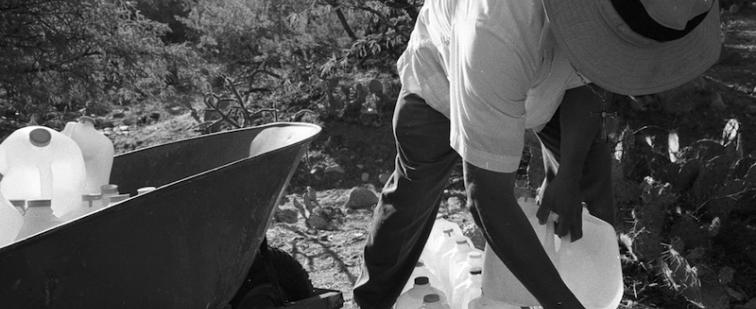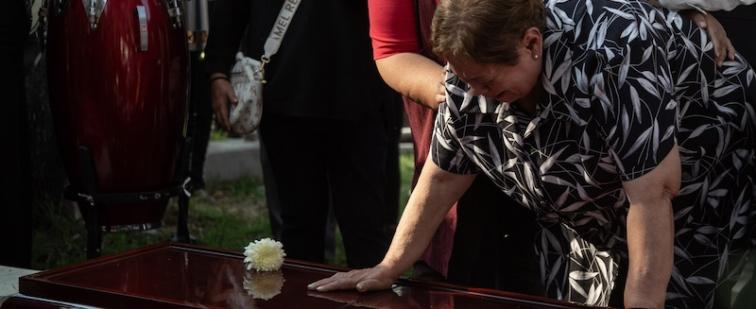Home
With a mandate from the U.S. public and the voters of Florida, Barack Obama has the perfect opportunity not only to keep his promise to end restrictions on Cuban American travel and remittances; he has the political capital to pursue an even more audacious approach. In so doing, he may be able to count on support from a majority of Cuban Americans, according to a brand new survey conducted by Florida International University (FIU).
Writing a thesis paper is normally the arduous culmination of years of study for most graduate students. For Lucía Morett of the National Autonomous University of Mexico, it turned into a fiery nightmare. While studying popular song and theater in Latin American guerrilla movements, she barely survived Colombian jets' aerial bombing of the jungle camp where she was staying. Four of her fellow students weren't as lucky. This is her story.
While the government stubbornly denies the existence of paramilitary groups, the people of Tierralta in the northern Colombian department of Córdoba know otherwise. Tierralta's residents are facing a wave of killings and massacres at the hands of these murderous gunmen. With nearly four million internal refugees, Colombia already has the world's second-largest humanitarian crisis, and the paramilitary resurgence is already making things much worse.
We the undersigned are North American academics who study Latin America. We wish to make known several concerns with regard to the electoral process now underway in El Salvador and which include legislative elections in January 2009 and presidential elections in March 2009. In particular, as academics who have studied electoral processes throughout the hemisphere, we believe that there are a minimal set of norms and conditions necessary for elections to be free, transparent, and democratic.
The growing demand in the United States for immigrant-detention beds has led to a new “virtual” form of detainment meant to save the government money. The Intensive Supervision Appearance Program (ISAP), launched in 2004 as an alternative to detainment, offers some undocumented immigrants the option to be released from detention after they agree to a series of strict rules, including a 12-hour home curfew, three face-to-face meetings per week with their caseworker, and unannounced telephone calls and visits.
President-elect Barack Obama should rescind the Monroe Doctrine, which is 185 years old this week. Obama would do well to depart from the bipartisan consensus of the Monroe Doctrine and truly chart a new course for change, one that respects the independence of Latin American countries and one that is in keeping with the values that he espouses. In any event, Latin America is leaving Washington behind.
With a string of huge new oil discoveries, pundits are wondering whether Brazil will become the next Venezuela—a poverty-stricken country that uses windfall oil profits to improve social welfare. Multinational companies are already jockeying for sweetheart deals, while social movements are busy forming strategies that will push the government—whether through higher royalty rates or outright nationalization—to make sure the potential profits do more than line the pockets of a few board room fat cats in the oil industry.
The fiery recent plane crash that killed the Mexican government's top anti-drug officials is an apt metaphor for the current state of President Felipe Calderón's drug war, which, after an embarrassing round of high-level arrests of anti-narcotics officials, appears to be similarly going down in flames.
The Brazilian capital's booming real estate industry and its allies in the local government are scheming to takeover the Bananal, a ranch-turned-sanctuary for indigenous groups living in the city's periphery. Real estate speculators want to pave over the Bananal and build a luxurious development complex to accommodate Brasília's richest residents. With police raids and court rulings against them, the indigenous groups have been left with few options.
 |
By August 2002, the region of Putumayo in southern Colombia had become ground zero for Washington's war on drugs: Plan Colombia was beginning to pick up steam, the cocaine trade was thriving, and illegal armed groups had reached the height of their power. In this excerpt from his new book Beyond Bogotá: Diary of a Drug War Journalist in Colombia, Garry Leech chronicles this toxic cauldron of violence and cocaine in a region that to this day remains one of the bloodiest in the country's armed conflict.











